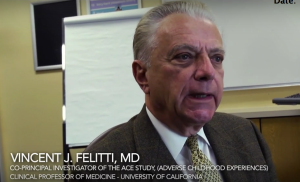“It’s about so much more than childhood sexual abuse,” says Johnna Janis about her feature documentary, Invisible Scars, a remarkable film about her own sexual abuse and her journey of recovery.
Janis produced and directed the film with long-time friend, Sergio Myers, an award-winning filmmaker and owner of 7Ponies Productions. Together, they took on topics many would consider too triggering or taboo to address and did so without sensationalizing sexual abuse or trivializing trauma. The result is a personal, powerful and informative movie.
Invisible Scars, which has been a six-year labor of love, will have a red-carpet premiereMarch 29 at the Harmony Gold Theater in Los Angeles, CA. It received an Award of Merit at IndieFest 2015.
What started in 2010 as a “small little project” about one woman’s healing journey “expanded” when Janis learned about the CDC-Kaiser Permanente Adverse Childhood Experiences Study (ACE Study).
Adverse Childhood Experiences
The groundbreaking research links childhood trauma to the adult onset of chronic disease, mental illness, violence and becoming a victim of violence. The ACE Study measured 10 types of childhood adversity that occur before the age of 18. They are: Physical, verbal and sexual abuse; physical and emotional neglect; exposure to a family member with mental illness, who is or has been incarcerated, or who is an alcoholic or addicted to some other substance; witnessing a mother being abused; losing a parent to divorce or separation. Of course there are many other types of trauma, such as witnessing a father being abused, seeing violence outside the home, witnessing a sibling being abuse, being bullied, racism, gender discrimination, living in a war zone, being an immigrant. Some of those experiences are being included in subsequent ACE studies, however they were not measured in the original ACE Study.
Of the 17,000 mostly white, college-educated people with jobs and access to health care who participated in the study, 64 percent had an ACE score of 1 or more; 12 percent had an ACE score of 4 or more (i.e., four out of the 10 different types of adversity). Thirty-two states and the District of Columbia have done their own ACE surveys, with similar results.
The researchers found that it wasn’t the type of ACE that was damaging, or that one ACE was more damaging than another. The remarkable finding that it was the accumulation of different types of childhood experiences that caused the most damage. In fact, the higher a person’s ACE score, the greater the risk of chronic disease and mental illness. For example, compared with someone who has an ACE score of zero, a person with an ACE score of 4 is seven times more likely to become an alcoholic, and twice as likely to have heart disease. ACEs contribute to most of the burden of chronic disease in the United States, as well as to poor social, economic and physical health outcomes.
“It seems like such a simple formula,” Janis remembers thinking, “Why doesn’t everyone know this?”

Invisible Scars Trailer
You Matter Mantras
- Trauma sucks. You don't.
- Write to express not to impress.
- It's not trauma informed if it's not informed by trauma survivors.
- Breathing isn't optional.
You Are Invited Too & To:
- Heal Write Now on Facebook
- Parenting with ACEs at the ACEsConectionNetwork
- The #FacesOfPTSD campaign.
- When I'm not post-traumatically pissed or stressed I try to Twitter, Instagram & Pinterest.
Speak Your Mind